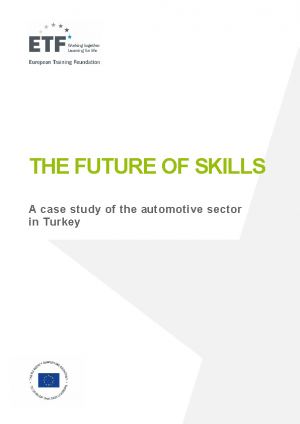The future of skills: A case study of the automotive sector in Turkey
Download the Summary Note
Key highlights
This study focuses on the future of skills needed in the automotive sector in Turkey. It is part of a wider investigation in ETF partner countries on how global trends are impacting economies and what actions are needed to prepare people for a changing world.
The automotive sector in Turkey is an important driver of growth in the economy, even if it represents less than 3% of total employment in the country. Because of its close trading partnership with major European economies, Turkish companies have adopted European technical standards, from safety rules to environmental regulations. The sector has a high use of industrial robots, with factories fully in line with typical smart factories. The workforce is notably young, and predominantly male. On the manufacturing side, most workers are medium to high skilled, whereas in the trading segment the workforce is primarily low and medium skilled.
Drivers of change in the automotive sector
The sector will soon be transformed by a wide range of technologies, but non-technological aspects such as social, economic, and environmental factors are also part of the future landscape. New business models are emerging, integration and complexity of global value chains are increasing, and so is fierce international competition. To remain relevant, the Turkish automotive industry needs to develop long-term strategies, in both recruitment and skills management.
Turkey’s participation in global value chains is below its potential for a variety of reasons, such as inefficient allocation of capital and labour, underdeveloped human capital and insufficient investment in innovation. A number of positive trends are emerging, however, such as companies becoming more sophisticated with functional upgrading, an increasing level of R&D centres in the sector, and the appearance of innovative companies that are developing original products and components. Moreover, given its geographical proximity to Europe, Turkey has a competitive advantage over products coming from the Far East.
Changes in jobs and skills demand
Workers will increasingly need to be able to apply their skills transversally over different jobs, with a horizontal knowledge of many disciplines, and some will require a deep expertise on more than one subject.
Technological changes in products and in production techniques will increase the demand for technical and associate professionals in science, engineering and ICT. Engineers and technicians will need to be receptive to becoming digitally literate in the basic principles of robotics and coding; a ‘third language’ alongside their native tongue as well as English.
There is a real need for upskilling low and medium-skilled blue-collar workers, called grey-collar workers, who will have gained more technical expertise.
The number of blue-collar workers is expected to decrease while the number of grey-collar workers will increase. Jobs on production lines will disappear, and will be replaced by technicians working on electronics, mechatronics, sensors, data programming, programming robots and cobots, or repairing cameras and sensors.
New jobs will emerge for professional ‘translators’ between machines and people – interpreting user needs between machines, data, and software processes for technicians and developers.
Finally, soft skills such as resilience, flexibility, problem solving and creativity are highly valued by companies and shareholders. A mix of technical and soft skills should be taken into account when considering future skills.
Meeting the challenges in skills demands
New recruits in the automotive industry seem not sufficiently skilled to meet the demands of their jobs because the educational institutions and programmes are not up to date nor aligned with the trends of new technologies and what the industry needs. A closer collaboration between institutions and the private sector is necessary, as is the idea that training activities should be seen as an investment in a company’s future.
Most of the larger companies and at least half of the SMEs organise training activities, from on-the-job training to mentoring and internal courses, but for smaller companies, a more cost-effective solution such as a public-private partnership approach could be a solution. The automotive sector has strong and organised sector associations, which play a key role in the industry by holding frequent high-quality training programmes which are free and open to all members.
In conclusion
A closer and deeper collaboration between companies and both VET and higher education institutions is vital.
Key competences and soft skills are increasingly essential in relation to the adaptability and the willingness of people to learn. These skills don’t only depend on VET and higher education, but also on the access to and high quality of basic education. In this respect, human capital development is vital, and there is a need for a quality increase at every level of education in Turkey.
Some of the suggested actions include:
- increasing the quality of learning for basic sciences (in particular mathematics and physics) from the beginning of the education system to the end, and the focus on new emerging technologies;
- prioritising for students the acquisition of the most needed cognitive, digital, foreign languages and communication-cooperation skills;
- the development of adult learning modules for up-skilling/reskilling professionals in a lifelong learning perspective;
- developing specific curricula and work-based learning modules in the sector for the transition from blue- to grey-collar workers.
Did you like this publication? If you would like to be notified when new content like this is published, subscribe to receive our email alerts.
